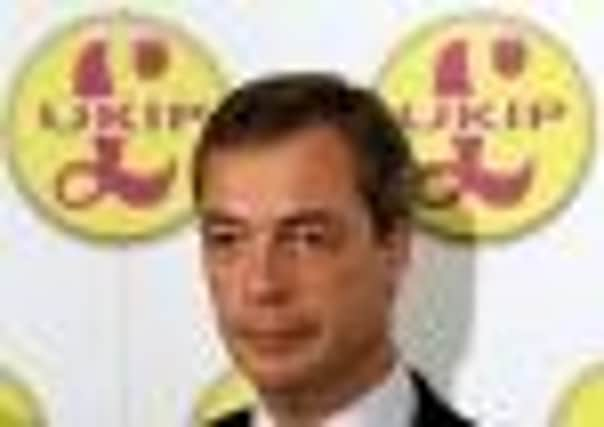Ewan Crawford: Minority rule is clearly not a laughing matter


Alongside jokes about the horror that lurks inside student fridges, the brilliant comedian and writer Ben Elton made his name in the 1980s by performing an act interspersed with gags at the expense of Margaret Thatcher.
After his anti-Tory routine, dressed in a sparkly jacket, he would remind his audience they had just heard “a little bit of politics there” as if to point out that it was both unusual and now acceptable for a comedy act to be overtly political.
Advertisement
Hide AdAdvertisement
Hide AdWhen it comes to the independence debate, opponents sometimes seem to shake their heads in the same way that a 1970s dinner-suited comedian might have done at Elton’s routine.
For some, the referendum, just like comedy, is no place for politics.
I recently discussed independence on television with a former senior Labour special adviser who told me in effect not to bother talking about tax, social welfare or any other specific issue because these were matters not for the referendum, but for a general election.
The point is, that these issues are indeed decided at an election, but the winner, of course, may have the support of only a relatively small minority of people in Scotland.
It may be that the winning party at Westminster is also the most popular in Scotland but between the year I was first eligible to vote and the date of the independence referendum in 2014 that will have been the case for less than half of that time.
In all other countries you can be pretty sure that a party that comes third or fourth in the voting is not going to form the government or be the major coalition partner. But in Scotland that is something we are told just to get on with.
A clutch of opinion polls at the weekend demonstrated just how divergent things could get over the next few years.
The most intriguing aspect is the advance of Ukip, the party once memorably described by the Prime Minister, David Cameron, as “fruitcakes, loonies and closet racists, mostly”.
Advertisement
Hide AdAdvertisement
Hide AdDepending on which poll you believe support for UKIP is running at almost double that of the Liberal Democrats or, at best for Deputy Prime Minister Nick Clegg, the two parties are neck and neck.
Yesterday Mr Clegg made another attempt at defining his party’s role: that of keeping a check on the Tory right.
Sadly, however, the Liberal Democrats are almost disappearing from view as an electoral force. Unlike some of their opponents I don’t rejoice at this news. I am sympathetic to the party’s stance on civil liberties, immigration and the environment – policy positions which would be attractive to many in the SNP and, I’m sure, to a sizeable number in an independent Scotland.
But because of its leadership’s strategy the party’s current primary function is to be of unwitting service to its rivals. For the Tories, the Lib Dems provide useful cover for the worst aspects of the austerity agenda and for Labour they are simply the source of votes from people disgusted at the U-turn on English university tuition fees and their decision to form a coalition with Mr Cameron and George Osborne.
The left-leaning political magazine, the New Statesman, points out this week that Labour has cooled on the idea of a Lib-Lab pact because depicting Mr Clegg’s party as right-wing accomplices keeps those disaffected voters on board.
In Scotland, the Liberal Democrats have wholeheartedly thrown themselves into the battle to stop independence, I suppose because of their stated distaste for nationalism, a concept which strangely becomes more palatable for the leadership when it comes to Britain and the British nation state.
But despite their hostility to the SNP I find it alarming that the Lib Dems could be replaced as Westminster’s third party by Ukip.
Even if things go particularly well for Labour at the next UK election and Ed Miliband enters 10 Downing Street, it is entirely reasonable to predict a Conservative opposition, led by London mayor Boris Johnson, ready to take power while looking over its shoulder at the even more right--wing Ukip. It may be that against all available evidence, this is a prospect that would be welcomed by many in Scotland.
Advertisement
Hide AdAdvertisement
Hide AdThe chances are, however, that this will be a new political landscape that would be met with dismay by most voters here. It is at best, shall we say, uncertain. But in an independent Scotland that uncertainty would be replaced with certainty. With a proportional representation system, the party or parties in government in an independent Scotland will have won the most votes – of that, alongside death and taxes, we can be sure.
Oddly, for all their talk of uncertainty this is one aspect – perhaps the biggest – that the anti-independence parties don’t like to talk about.
Although in all democracies there is uncertainty as to who is going to win a general election, there is usually certainty that the most successful party will form at least part of the government. Not in Scotland.
This isn’t about a caricature of left-wing Scotland versus right-wing England. It certainly isn’t about left-wing Scotland riding to the rescue of progressives south of the Border. As the environmental campaigner Adam Ramsay recently pointed out, top-up tuition fees were only imposed on people in England thanks to the votes of Scottish Labour MPs who knew this regressive measure would not be introduced here. Instead it is about democracy.
I believe an independent Scotland would lead to a more equal, entrepreneurial, and self-confident nation. The referendum itself will be decided mainly on economic arguments. But the prospect of having a government, of whatever hue, that is supported by most people all of the time, should surely be the very least we deserve.